
- Home
- DescriptionNews
People urged to get jabs as June 7 mass vaccination kicks off
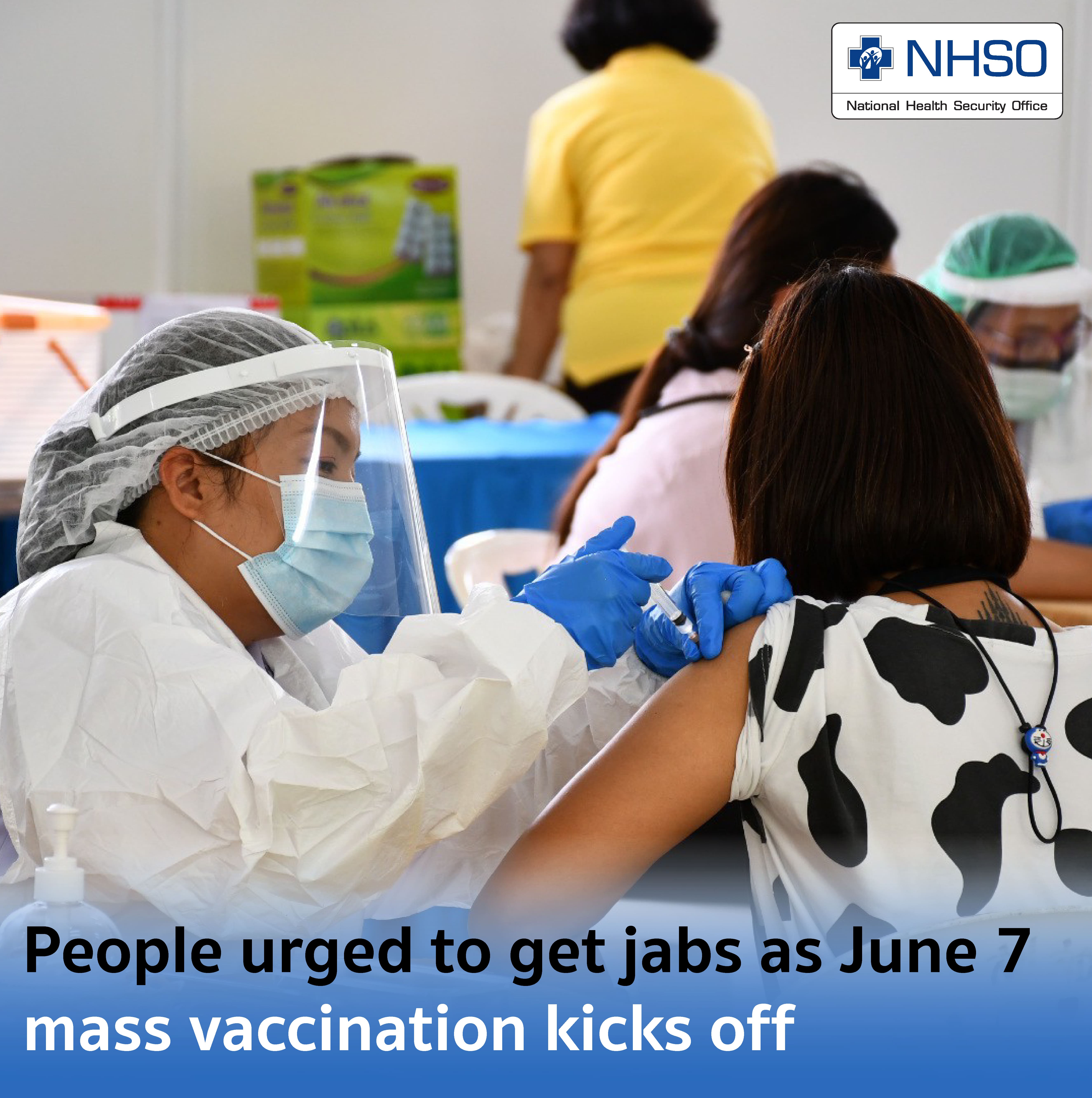
People urged to get jabs as June 7 mass vaccination kicks off
As the country’s mass COVID-19 vaccination drive begins today (June 7, 2021), members of the public are assured vaccines being used in the national immunisation programme are safe and effective.
People are also encouraged to get vaccinated against the novel coronavirus as soon as they are offered a jab so that the country will be able to reach herd immunity and everyone in this country will become safer from new infection.

There are two important messages for all people living in Thailand, said Dr Daniel A. Kertesz, the World Health Organization (WHO) representative to Thailand.
Vaccines against COVID-19 are effective and safe and eligible people in Thailand are being encouraged to get vaccinated against COVID-19 as soon as possible, said Dr Kertesz.
“The WHO country office will be with all Thai authorities in the beginning of the mass vaccination campaign as we have been being with them since January 2020 and will be with them until the outbreak is over,” he said.
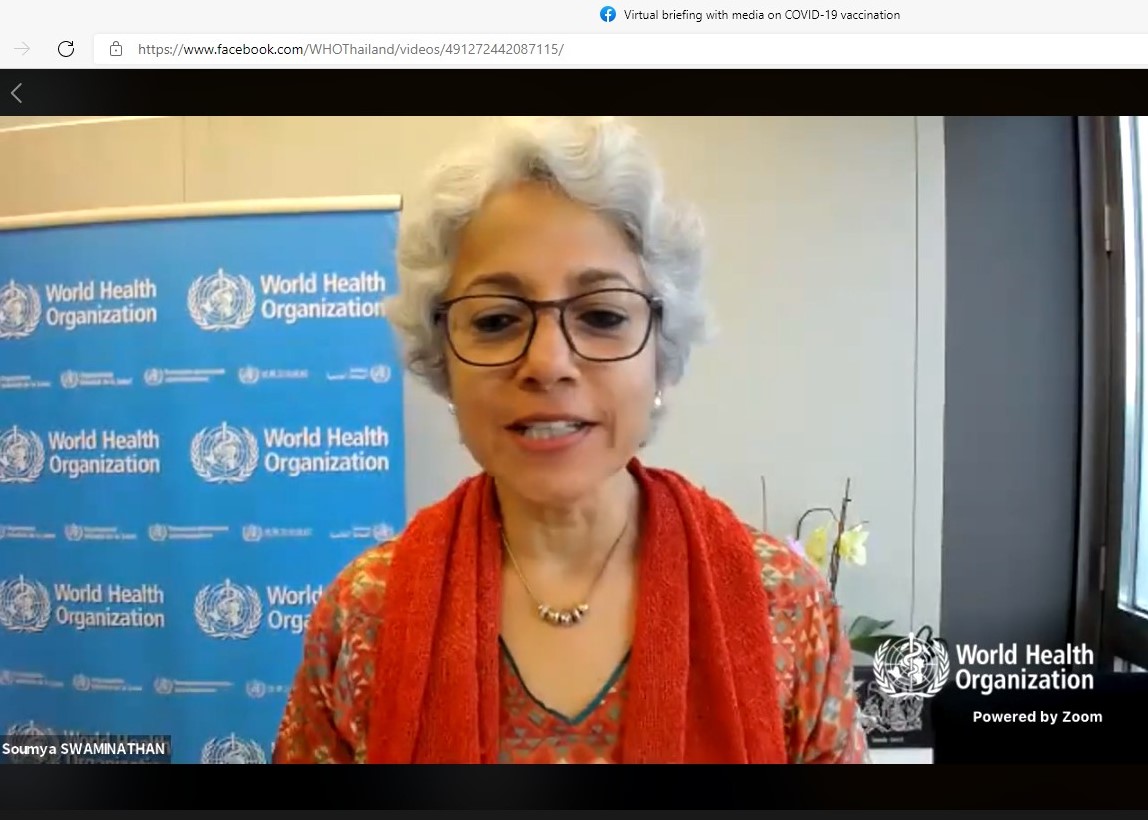
Current preliminary data suggests the COVID-19 vaccines approved by WHO stimulate enough immunity to retain substantial efficacy against most variants of SARS-CoV-2, especially for severe disease, hospitalisation and death, said Dr Soumya Swaminathan, WHO Chief Scientist.
Vaccines offer better immunity
These COVID-19 vaccines offer much higher levels of immune response than natural immunity acquired through natural COVID-19 infection, which only last approximately six months, she said.
The protection rendered by COVID-19 vaccination should hopefully last longer, she said, adding that WHO is determining whether COVID-19 booster shots will be needed to cope with SARS-CoV-2 variants of concern.
As so far more than 1.8 billion doses of COVID-19 vaccines have been administered in 211 countries, areas, territories and economies, monitoring mechanisms remain in place to ensure safety and efficacy of these vaccines in real-world applications, she said.
And while there still are limited supplies of COVID-19 vaccines, WHO is recommending countries to prioritise as to who should get the vaccine first, she said.
Healthcare workers, front-line workers, the elderly, people with underlying medical conditions, and communities with high risk of infection should be given a priority in the vaccine drive in each country, she said.
WHO has been working together with countries currently carrying out COVID-19 vaccination programmes, to form a cohort to follow up on vaccines’ efficacy, protectiveness and adverse events following vaccinations, she said.
“Thailand has an excellent system to do this. It has very good infrastructure and can provide a lot of data to the world,” she said.
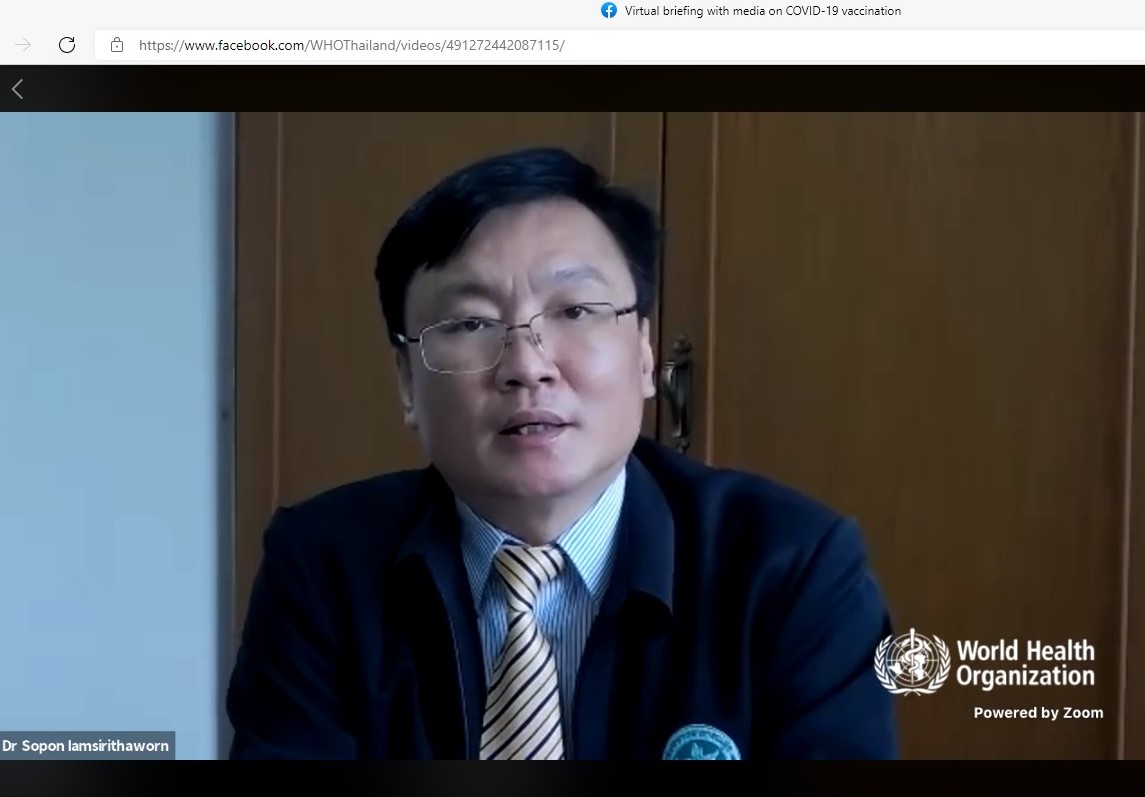
Equal access for all
Prime Minister Prayut Chan-o-cha has policy to ensure equal access to COVID-19 by all Thais and foreigners living in Thailand, said Dr Sopon Iamsirithaworn, deputy director-general of Department of Disease Control.
A small-scale COVID-19 inoculation programme began on February 28, 2021, and has been continuing up until now that the mass vaccination rollout begins on June 7, 2021, he said.
The limited supplies of COVID-19 vaccines imported previously were intended mainly for front-line healthcare workers, while the mass vaccination drive will from June 7, 2021 be focused on a second group of target population – people who are 60 years old and older and people with underlying medical conditions, he said.
Vaccines will be allocated and distributed in approximately four rounds this month (June) because vaccine supplies have been and will continue to be delivered in batches, he said.
Throughout last week, about 2 million doses of both the AstraZeneca and Sinovac vaccines have been distributed to the provinces ahead of the June 7, 2021 launch of the national mass vaccination programme, he said.
More vaccine supplies to come
By mid-June, a new round of vaccine distribution will begin when more supplies of the vaccines are delivered, he said, adding that between 5 and 6 million doses of these vaccines will be then distributed to all parts of the country this month.
For the time being, a priority will have to be given to Bangkok, Nonthaburi and Samut Prakan where the COVID-19 infection situation is far more serious than anywhere else, he said.
This means those areas with a less serious outbreak situation or with no new infections reported will possibly be given a smaller supply of the COVID-19 vaccine at the moment, he said.
After all, all areas of the country will in four to six months be supplied with an equal proportion of the vaccine, he said.
Previously, Thailand could administer at most 100,000 doses of the vaccine per day simply because the country had limited supplies of the vaccine, he said.
But now that more supplies of the vaccine have arrived and the mass vaccination programme is launched, at least 500,000 doses will be administered on the first day of the programme (June 7, 2021), he said.
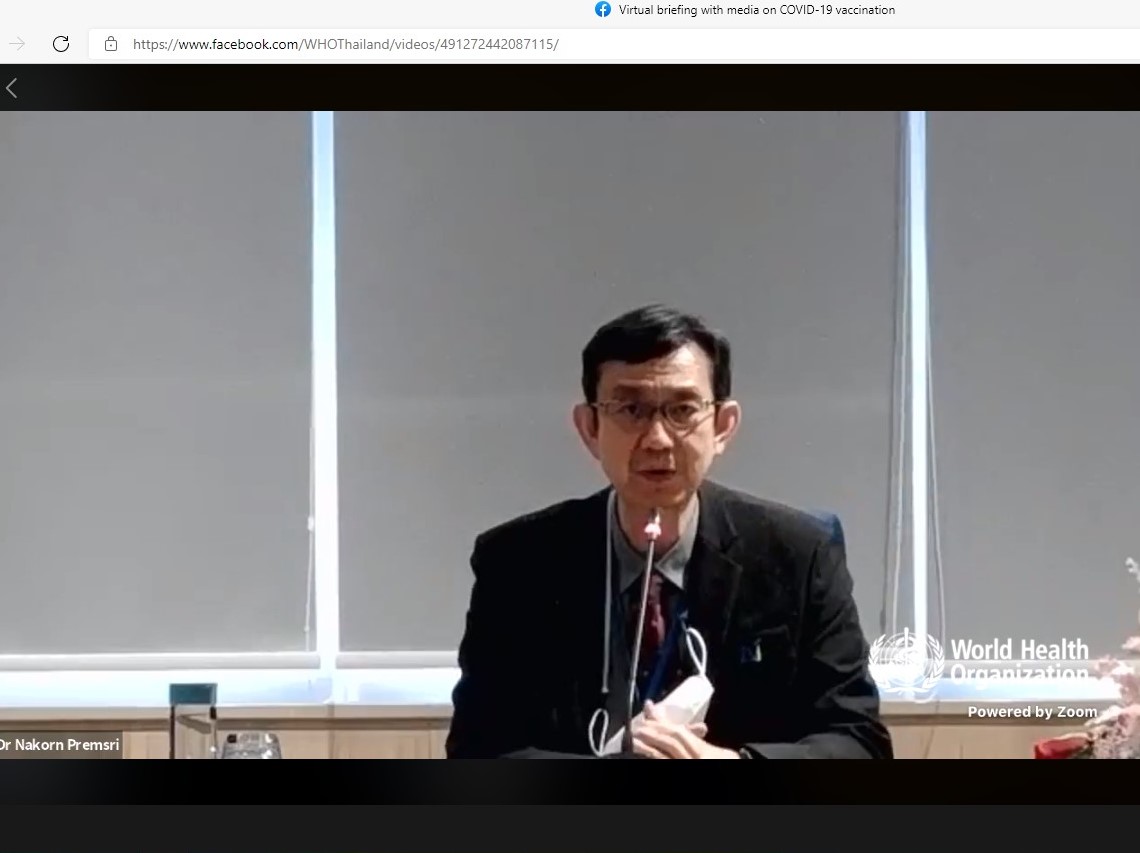
Actual vaccination capacity
The country actually has a capacity of injecting between 500,000 and 1 million doses of the vaccine per day and about 10 million doses per month if it has sufficient vaccine supplies, he said.
Both Thais and foreigners living in the country are eligible to receive the vaccine under the mass vaccination programme, he said.
Thailand aims to secure 100 million doses of the COVID-19 vaccine and administer them all by the end of this year, said Dr Nakorn Premsri, the director of National Vaccine Institute.
As of June 1, 2021, a contract has been signed on a supply of 61 million doses of the AstraZeneca vaccine, which will be delivered in batches from June onwards, he said.
Six million doses of between 10 and 15 million doses of the Sinovac vaccine secured in a contract, plus 1 million doses of the same vaccine donated by the Chinese government to Thailand, have already been delivered, while 3 million more doses will arrive in each of the following months, he said.
A contract for a supply of 20 million doses of the Pfizer COVID-19 vaccine and another contract for a supply of 5 million doses of the Johnson & Johnson COVID-19 vaccine are being negotiated, he said.
Negotiations by a number of other parties for supplies of other COVID-19 vaccines, namely Moderna, Sinophram, and Sputnik V as alternative choices are underway, he said.
NHSO’s role in mass vaccination
As part of the government’s COVID-19 inoculation programme, the National Health Security Office (NHSO) has been funding not only the arrangement of COVID-19 vaccination units outside of the hospitals, but also a financial compensation programme for people suffering from side effects of the vaccine and adverse event following vaccinations.
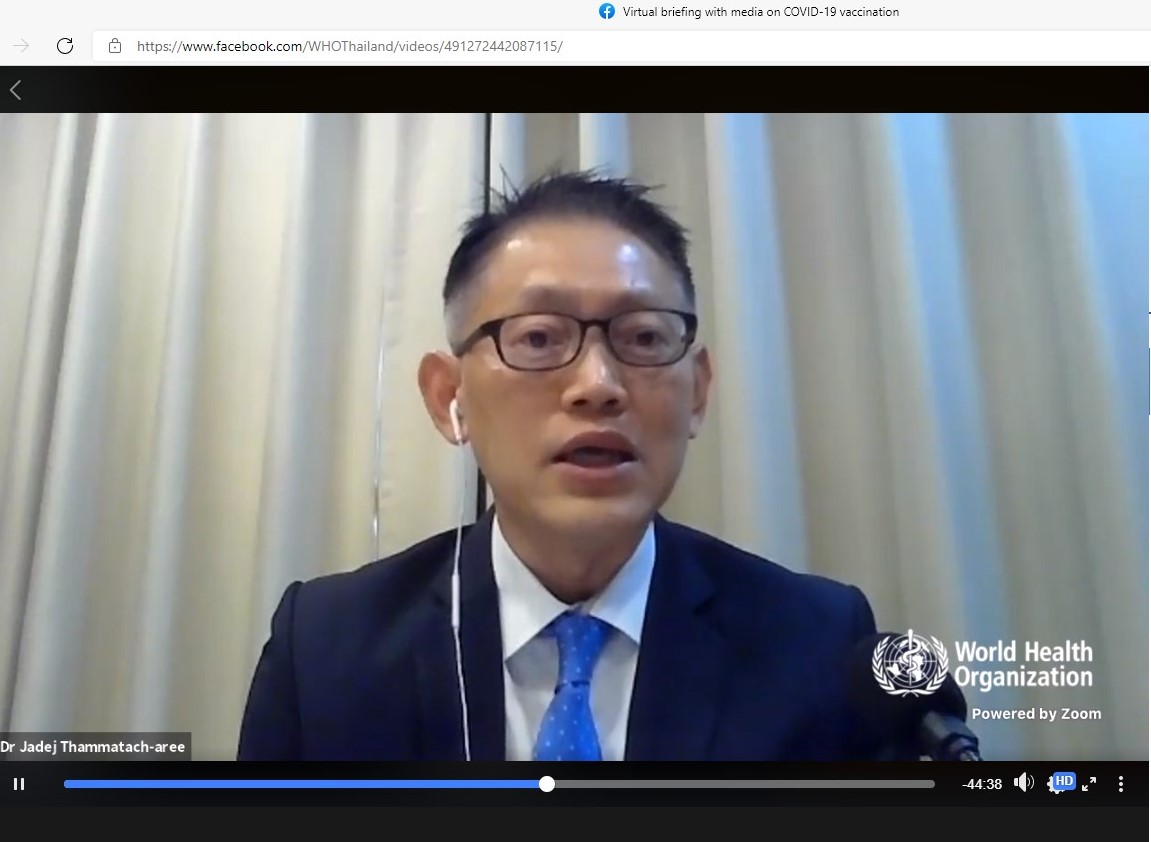
Anyone, with or without a COVID-19 vaccination insurance policy, who suspects he or she encounter a side effect of the vaccine is encouraged to consult a medical doctor and file a request for compensation under this programme, said Dr Jadej Thammatach-aree, secretary-general of the NHSO.
The compensation programme is a mechanism to ensure all people that they will be promptly taken care of if they ever experience any serious side effects of the vaccine, he said.
As of June 2, about two weeks after the compensation programme was launched, a total of 250 petitions have been filed for compensation and 150 of them have already been compensated for, he said.
Most of these cases were persistent numbness that required hospital admission, he said.
“I’m very impressed at the trust Thai people have in the healthcare system, doctors, nurses and other healthcare providers…This will largely benefit the country’s immunisation campaign,” Dr Kertesz.

